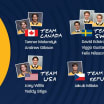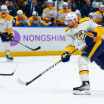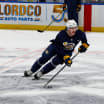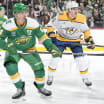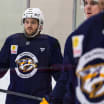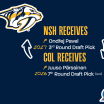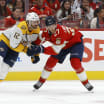NASHVILLE - The prospects are jammed into every bit of bench space available in the Nashville Predators' dressing room at Bridgestone Arena.
The room is brightly lit. The carpet pristine. Suspended from the ceiling is a giant Predators logo backlit creating a dramatic effect.
The lockers, devoid of NHL players' effects, contribute to the notion that this room is an open book, that at least for the time being this room belongs to these 35 young men or at least the possibility exists that this room could be theirs.
Climbing the Ladder: Behind the Scenes at Predators Development Camp
An Inside Look at Nashville's Prospect Development Week
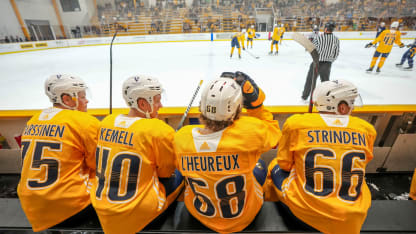
Some of the team's development staff are seated on the floor. Members of the coaching and scouting staff both at the NHL and American Hockey League level are backed up in the hallway leading to the dressing room.
In spite of the tight quarters there is a sense of anticipation as the group waits for head coach John Hynes.
It's the end of the second full day of the team's six-day development camp. The program prepared by the head of player development Scott Nichol, a former Predator player, includes a dizzying array of events and meetings and on-ice sessions and early-morning workouts and community events and outings.
But in some ways what Hynes will tell these young players who have literally gathered from around the world, from Russia and Finland and Columbus, Ohio and Winnipeg, Manitoba, will distill exactly what the camp is about.
By the time Hynes is done he will have offered for these players a window onto the building of an NHL franchise and more specifically he will tell them how the challenges they face as individuals who dream of an NHL career is no different than what the organization is being challenged in building a team that could one day carry a Stanley Cup down Broadway.
The two, the individual challenges and the organizational challenges, are inexorably linked.
There is no sugar coating any of this. The Predators aren't a championship team, Hynes tells the prospects. Not yet.
So the coaching and management staff pour over the details, the makeup of the team, how they practice, how they are coached, how they travel, rest, recover.
"All the components that it takes we're trying to get there," Hynes said. "We're a playoff team but we're not a championship team, yet."
"How do we get there?" Hynes added. "As an organization, as a team, as coaches… you've got to study. You don't just become a champion. You don't just become an NHL player."
And there's the rub, no?
The group here includes three first-round players and a handful of other draft picks with great promise. It might be the most talented group to come to a Nashville development camp in many years. Maybe ever.
And so over the course of a week each of these players will absorb myriad bits of information that might help them on their journey but at the core of it will be an internal will to use all of the resources at their disposal to make it so.
"You can't just think as a team our goal is to the win the Stanley Cup. It's our behavior, the things we do every day to give us the chance to get there. It's the same thing for an individual player," Hynes said. "How do I get to be at this level? And do I have the right behavior which is a lot about what this camp is?"
One of the team's mottos is 'don't beat yourself' it's a motto the individual players who dream the NHL dream would do well to remember.
"Don't beat yourself; we don't need guys that are going to be out partying all the time," Hynes explained. "We don't need guys that are going to be late for meetings. We don't need guys that are going to miss the flight. We don't need guys that dress like (crap). We don't want to beat ourselves."
From the moment the prospects began arriving in Nashville on Sunday evening - some arriving more seamlessly than others given the travel woes that have plagued North American in recent weeks - the theme delivered so concisely by Hynes has been consistent.
There is empowerment, of course. Daily reminders about how the team and its staff are there for the players. But all of it shot through with a powerful undercurrent of how the players themselves are driving the bus and that the path to the NHL is narrow and steep and in the end it's the players who chart the course. No one else.
The camp attendees are reminded of this every time they put on the development camp t-shirts with the mantra 'campers or climbers' inscribed on the back.
Campers don't make the NHL.
Climbers might.
Every day the coaching staff identify a climber of the day like young netminder Olivier Ciarlo, a free agent out of the Quebec Major Junior Hockey League who went through flight delays and cancellations and arrived just in time to step onto the ice for the players' first workouts and didn't miss a beat.
One day Chase McLane was recognized even though he won't step foot on the ice this week because of a knee injury suffered during the college playoffs last spring against Notre Dame. Still, the Penn State forward who was selected in the seventh round of the 2020 draft has been doing his best in a limited role to soak up as much as possible this week.
"It's been a good time," said the outgoing McLane. "I've learned a lot from just even being in the weight room and just taking it all in. Even just watching the guys on the ice and seeing the little stuff that they work on out there is helpful for me and I can work on that and know the stuff that I can implement into my game when I get back."
McLane epitomizes in some way how the development camp is ground zero for a relationship that allows the player and team to stay closely connected. As a forward he has been in regular contact with longtime NHLer (and original Predator) Sebastien Bordeleau who handles the forwards' development while two-time Stanley Cup champion Rob Scuderi handles the defensive corps and Dave Rook is tasked with goalie development.
"It's awesome. Some kids don't have the opportunities to do that," McLane said. "If I'm struggling with something mentally they give me all the resources to take care of it. If I need someone to watch my clips and give me feedback on my game they can do that. it's just another resource that helps a ton."
Scuderi and Bordeleau come at the process with a common goal but from very different perspectives.
Scuderi didn't have a development coach when he was coming up through the system in Pittsburgh and it wasn't a straight line for him. But he's had to learn that not all players have his mindset.
"I never liked to have too much contact as a player (with coaches), so I assumed that everyone was the same," said Scuderi a fifth-round pick who won a Cup in Pittsburgh in 2009 and one in Los Angeles in 2012 and played in 122 postseason games in his career.
He's learned that this generation of players is different.
"I've learned to get to know guys and instead of assuming to know what they wanted, I would just ask them and just be straightforward. What do you like? Please tell me and don't be afraid to reach out if you need something else. We have a of tools at the organization's disposal," Scuderi said.
Scuderi joined the organization in the summer of 2019. During a normal season he will try and make it to Milwaukee, home of the Predators' AHL affiliate, four or five days a month, getting on the ice for some extra work with the defensive prospects. As well, he'll have regular contact with the defensive prospects who aren't in the AHL.
"Have some casual talks with these guys because I've been through it before. I didn't go straight to the National Hockey League. I needed the American Hockey League so I know everything they're going through," Scuderi said. "Do you feel like you're being watched? Do you feel like anyone's caring? What am I doing? They're all valid thoughts and things that I think every player has thought before. So you're just trying to reaffirm the process and say just keep putting your best foot forward and hopefully that has a great impact for Nashville."
Bordeleau, drafted by Montreal in 1993 and a member of the original Nashville roster in 1998, began his development career after retiring following a long stint playing in Europe primarily to help his son Thomas with his game. Thomas ended up being picked 38th overall by San Jose in 2020. Bordeleau was a successful freelance skills instructor in Quebec and worked with the Canadian women's national team as a skills coach before joining the Predators three years ago.
He views his relationship as a mentor or big brother, someone with whom the players can build a level of trust. Like Philip Tomasino who was one of the first players Bordeleau began working with in his role with the Predators after Tomasino was selected 24th overall in 2019.
"And now he's in the NHL and I'm glad I was part of his process," Bordeleau said. "My players, the prospects here, they call me for different reasons. It could be most of the time it's hockey related but it could be hey, I'm struggling with my sleep or this or that. We share a little bit more than the other guys that I have in the summer."
"With my players it's every week that I watch their games," he added. "If I see something I might reach out to them if not then I let them be and then every now and them, like I don't want to bug them every week or every game because if you're saying something to someone you've got to give them time to adjust and progress," Bordeleau said.
All kinds of players bearing all kinds of skills and expectations and pressures have converged on Nashville for the week.
It's not a coincidence that when the group gathers for a welcome meeting on the arena level at Bridgestone Arena on Monday morning the video shown to the group doesn't show exemplary plays by Roman Josi or Filip Forsberg or Ryan Johansen or Matt Duchene but rather thunderous hits and defensive plays and goals by the current generation of Predators players like Tomasino and Tanner Jeannot.
Those are players those at this camp can identify with. In fact Hynes invokes Jeannot in his speech outlining how the undrafted 25-year-old Jeannot went from an NHL training camp to an AHL training camp to the ECHL. Coaches told him he needed to play more physical, play harder. Hynes tracks Jeannot's evolution from the ECHL back to the AHL to a one-game call-up to Nashville.
"Totally overwhelmed," Hynes recalled.
Jeannot was sent back to the AHL where he becomes a captain. He gets called back up briefly. Finally he's called back up again and not only carves out a roster spot in Nashville but finished the 2021-22 season with 24 goals to lead all NHL rookies.
"He didn't have a high draft, high acumen, what he was was a guy that could accept coaching," Hynes said. "He was a self-starter. He could handle adversity. His road to the NHL wasn't easy. It's not always easy."
By his count this is Scott Nichol's ninth development camp. Nichol played 662 regular-season games including four seasons in Nashville. The first D-camp he organized as director of player development (he also holds the title of assistant GM in Nashville and GM of the Predators' AHL affiliate in Milwaukee) he did pretty much on his own.
Now he notes there is a veritable army of people who are involved in creating the development camp.
If that's the case, Nichol is the field marshal of that army making sure the myriad moving parts fit together as much as possible. It's a big job not without the odd curve ball.
On the first of two early-morning track sessions at a nearby private high school a van load of players takes a slight detour to a different location. Stuff happens.
Even getting all the participants into town and ready to go was a challenge given the current travel landscape.
Joakim Kemell, the 17th overall pick in the draft in Montreal a couple of weeks ago, planned to have his equipment shipped to Nashville from Finland for the camp. Didn't happen.
"So, you have your first-round pick, we're super excited for him, offensive guy, he has no gear," Nichol said with a shrug. "So, we take him down to the equipment room and we're trying to fit him with gear. Just whatever we got here. It's not like we have a sports store here, this is an NHL team."
So, Kemell hit the ice with brand new skates and underwear and gloves.
Then there was the first-year camp invitee who missed his flight and had to get a shuttle to downtown Philadelphia and stay in a hotel until the next day so he could get to Nashville.
"But he's not old enough to check into a hotel himself so we have to call the hotel get him in there and then shuttle back (to the airport)," Nichol said. "The first few days are a little chaotic. But then things settle in a little bit."
The young men who have descended on Nashville represent the gamut of possibilities for the Predators.
There are 18-year-olds who have come straight from the draft and look like they may have wandered away from a high school field trip and you have players who are 20, 21 or 22, for whom this is old hat and for whom the clock is ticking on their own way forward.
There are three first-round picks, Kemell, netminder Yaroslav Askarov and Zach L'Heureux and a couple of highly touted second-round picks like Luke Evangelista and Egor Afanasyev. There are seventh-round picks and free-agent invitees.
Regardless of how they got here and the expectations that might exist for them they are all being evaluated, all expected to bring their best stuff to the table.
There's Hynes and his NHL staff. Karl Taylor, head coach in Milwaukee, is here with his staff. There's Nichol and his key development coaches Scuderi, Bordeleau and Rook. Skating coach Jacki Munzel does regular on-ice sessions. Mari-Etta Parrish and two dieticians are on hand not just to present but to make sure that all of the players get some one-on-one time during the week to discuss nutrition and specific dietary goals for the season.
"You have a short amount of time to achieve a lot, nutrition is part of that," Parrish tells the group during a session that includes a game of nutritional truth or dare involving questions and samples of interesting, healthy foods the players may not be familiar with.
David Good leads the strength and conditioning staff providing information that can and should help the players not just during the week but wherever their season will take them in the fall. He's also in charge of making sure they don't succumb to heat stroke in the humid Nashville sun.
Kevin Morley, the team's head athletic trainer, gives a presentation on the complex and complicated issue of cannabis use and related topics.
"You're responsible for what you put in your body," Morley reminded the group. "The decisions that you make are not without repercussions."
Assistant GM and Director of Scouting Jeff Kealty and his right-hand man Tom Nolan, Chief Amateur Scout, are here as are some of the team's scouting staff. Nolan and Kealty will assist Nichol and the development coaches as the camp comes to an end with exit meetings.
Doesn't matter whether you're a free-agent invitee or first-round star prospect everyone gets face time before they head home.
"It's just communication and showing the plan," Nichol said. "All these kids want a plan. They want to know what's in store for them. They want to see a path for them. So we have an exit meeting just to see what our expectations are for them in junior or first year college."
This is Afanasyev's third camp.
The 45th overall pick in 2019, he admitted he wasn't too sure what to make of it all when he arrived shortly after being drafted.
"Definitely a lot of fun, but I would say first one 2019, I was just like a little bit nervous and stuff. This one just come in I'm pretty much a veteran here," the gregarious Afanasyev said.
His comfort level extends to the season - he played in Milwaukee last season and had 33 points in his first pro season - when he knows that if he has questions or concerns he just has to pick up his phone.
"I think it's very important because these are people who you see have played at the highest level at the NHL and they've helped me a lot along the way," Afanasyev said. "Specifically Bords (Bordeleau), he's working with the forwards, working with me back when I was in the OHL. He was taking a close look at me and stuff. And now throughout the years he reaches out to me he comes out with us on the ice down in Milwaukee. Obviously they want to help me be in the NHL as fast as I can. Huge thanks to them for sure. Scott Nichol same thing. He's everywhere. Busy man but he always has time to talk to you ask you questions so it's great."
So, there's a lot going on this week and it's not all related to the game itself.
The players get a taste of the vital connection between the team and the community.
In the middle of the camp the attendees are divided into smaller groups and help out with the team's community relations staff visiting different organizations or venues related to community outreach including visiting a local children's hospital, the Hispanic Family Foundation, a Boys and Girls Club, a retirement home, one of the youth hockey facilities the team helps operate among others.
"All the guys here we love doing things like that. Especially with COVID the last couple of years and not being able to get out and help out definitely sucks for us," said L'Heureux. "It's a whole other side of the game. We're role models for a lot of these kids and for us to be able to go there and speak to them and hang out with them for a bit puts a smile on our face and if we can make their day doing it it's a plus-plus."
And while they may not have the familiar faces of a Josi, Forsberg or Duchene the fact the players are sporting familiar t-shirts and logos makes people stop in their tracks on the crowded streets of downtown Nashville and at their various community stops.
"Of course we're not the big names yet but the community here in Nashville has been nothing but welcoming. Everybody's a huge Preds fan. They really take their team to heart. Just down Broadway or you're down the street there's always somebody recognizing you, wishing you luck and wanting to take a picture. It's really enjoyable and it's something that's pretty special for us," L'Heureux said.
L'Heureux, 19, lives just outside Montreal and was at the recent draft at Bell Center and was in fact in the team's suite when Kemell was selected and helped welcome him to the team.
The hardest part of D-camp?
He laughs.
"Everything's tough to get through I think. At this point every practice, every track, every workout, everybody's giving their 100 percent trying to impress," L'Heureux said. "Nobody said it was going to be easy it's just that grind, that mindset that we're pushing each other all to get together you've got to embrace it, enjoy it."
In some ways development camp is like a slideshow of what the future might hold for these talented players or at least some of them. But it's also time for some perspective.
"They can make mistakes here," Nichol said. "Like kids miss their flight because they just they thought they were on a flight with somebody else. These are the things they can do at development camp and we have a lot more patience for it. So when they do coming to training camp, like if they miss their flight coming into training camp that's not a good thing. So those are lessons they get and they get to know the staff."
And there's a pattern the team has developed under Nichol's time as the head of development. Any of the Preds' prospects who have played a year of pro come back to development camp because it allows them to continue to build a relationship with the staff and to show where they're at with fitness tests, weight and other elements of their development. And they're great resources and mentors for the first-timers.
"I think it's important for these kids to see a (Jusso) Parssinen or Egor Afanasyev. So they sit beside them in all the meetings and all of a sudden the young kid goes back to Spokane but then they see Parssinen playing in the NHL and they go holy crap, I'm right there. I sat with this guy; I had lunch with him," Nichol said. "That's to show them how close they are to making it to the NHL and how hard they got to work."
The final couple of days of camp are filled with exit meetings and on-ice sessions and confirming flight details with veteran Director of Team Services and Player Relations Brandon Walker. Friday morning is the gold and blue team scrimmage at the Ford Ice Center in Bellevue a short drive outside the city.
There is a big-time feel to the event as fans crowd the metal stands, the anthem is played and starting lineups are introduced. The game is streamed live by the Predators and there are pregame interviews with some of the development and scouting staff while pretty much all of the hockey operations department including GM David Poile are on hand with lineup sheets for making notes during the game.
The contest itself is high-tempo with glorious chances and great plays on both sides.
It's easy watching to forget that this is July. These are kids. Their journey is at its beginning not at an end. And that's okay. More than okay really.
"Some are going to fall off and there's nothing wrong with that," Nichol said. "Some of these kids their ceiling is college hockey, their ceiling is juniors, there's nothing wrong with that or the American League. But we have what 35 guys here. There's not that many spots in the NHL for 35 players so even though it's a development camp you've still got to know you're getting evaluated every day and you've got to push and you've to be the best at development camp then you've got to be the best at rookie camp and that's how you kind of keep climbing the ladder and getting better."
This story written by Special Contributor Scott Burnside.


